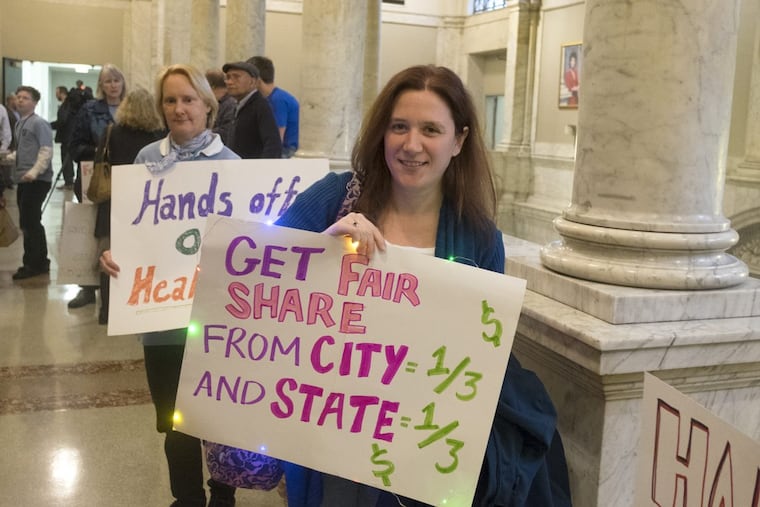Community College of Philadelphia faculty inch closer to strike by mid-March
The vast majority of faculty and support staff at Community College of Philadelphia have authorized their union's negotiating team to call a strike to help resolve negotiations that have dragged on for more than two and a half years. The earliest a strike would occur would be March 18.

Faculty at the Community College of Philadelphia have authorized their union leaders to call a strike vote if progress on a new contract isn’t achieved within three weeks, a union leader said Tuesday.
The union, which represents about 1,200 faculty and support staff, announced that 91 percent of its members had cast ballots in favor of the action during four days of voting that ended Monday.
“There’s really a strong base of support across all three bargaining units for fair contracts and for [college president Donald “Guy” Generals] and the board of trustees to move off their unreasonable demands that they have been on for three years,” said Junior Brainard, copresident of the union. “Our members are willing to strike if it’s necessary, although obviously we are hoping to resolve this through negotiations.”
Brainard, who teaches English at the college, said the union would hold another vote before a strike; the earliest that members would walk out would be March 18. The 27,800-student college is on spring break next week.
The strike-authorization vote is the latest development in negotiations that have been stalled for more than 2½ years, largely over issues of faculty workload, health insurance, and compensation. Generals late last month said the college was considering imposing a contract on union members, its so-called last best offer, which was released last May. Union members have been operating under the terms of the contract that expired in August 2016.
Generals said Tuesday that the college had delayed imposition of a contract because it had been working with a mediator and was optimistic progress would occur.
“We’re a little less optimistic now, but we’re still hopeful a strike can be avoided,” he said.
The college, he said, is preparing for the possibility of a strike. The college would try to maintain the class schedule, but if not enough faculty show up, classes would not be held, he said.
“We will assess it day by day,” he said.
A sticking point is the college’s attempt to increase the workload of new full-time faculty members from four courses a semester to five. Current instructors would have a choice: Those who opt for it would get a $9,000 increase in base pay. Nearly a third of faculty already teach five.
The union has argued that faculty already teach more students in four classes than faculty at other community colleges do, and many students come to the school needing remedial work and extra attention to reach their full potential. Under the college’s proposed workload increase, the union contends math faculty would teach 40 more students per semester than faculty at surrounding community colleges, computer-science faculty 56 more, English faculty 30 more, and science faculty 20 more.
“Our students are first-generation college students," Brainard said. "They are immigrants. They are single parents and working adults. They are our students, and they need support.”
Generals countered that the argument is based on the number of students classes are capped at, rather than the reality. Class caps range from 20 to 36, the college said, and few reach 36. The average class size is 23, according to the school.
The union has proposed lowering class sizes and giving students more support services in the library and learning lab and in counseling and advising.
Compensation for some of the union’s lowest-paid members also has been a major issue, Brainard said. Some support staff earn as little as $12 an hour, a wage the college has proposed raising to $15 an hour by Sept. 1, 2020.
“I’ve worked full-time at CCP for 20 years and still qualify for food stamps,” Paula Perry-Gable, who has worked at the college in housekeeping for more than 20 years, said in a statement released by the union.
The minimum starting salary for a full-time faculty member at CCP is $50,529 and the average below $70,000.
Among those backing the faculty is Hazim Hardeman, the first CCP graduate to become a Rhodes scholar. Hardeman, who is currently studying at Oxford, got his associate’s degree at CCP and his bachelor’s from Temple University in 2017. CCP has touted his success.
“The students whose parents can afford it get comparatively well-supported faculty and staff at Temple and Drexel and Penn and Oxford,” Hardeman said in a statement. "The kids who can’t get overworked faculty and staff at community colleges. Please fight this reality.
“If the college is serious about providing a world-class education, they have to provide world-class support to faculty and staff.”